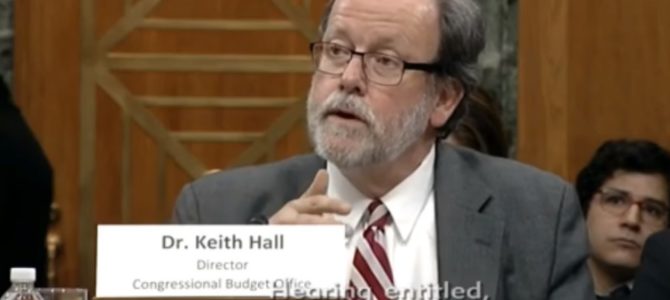
In a blog post released last Thursday, the Congressional Budget Office (CBO) attempted to defend its actions regarding what I have characterized as an illegal budget gimmick designed to facilitate passage of an Obamacare bailout. When fully parsed, the response does not answer any of the key questions, likely because CBO has no justifiable answers to them.
The issue surrounds the budgetary treatment of cost-sharing reductions (CSRs), which President Trump cancelled last fall. While initially CBO said it would not change its budgetary treatment of CSRs, last month the agency changed course, saying it would instead assume that CSRs are “being funded through higher premiums and larger premium tax credit subsidies rather than through a direct appropriation.”
In its newest post, CBO claimed this change comports with Section 257(b)(1) of the Balanced Budget and Emergency Deficit Control Act (aka the Gramm-Rudman-Hollings statute). The agency stated the change complies with the law “because the CSR entitlement is assumed to be fully funded.”
That claim fails on multiple fronts. First, it fails to address the states that did not assume that CSR payments get met through “higher premiums and larger premium tax credit subsidies.” As I noted in a March post, while most states allowed insurers to raise premiums for 2018 to take into account the loss of CSR payments, a few states—including Vermont, North Dakota, the District of Columbia, and a few other carriers in other states—did not. In those cases, the CSR payments cannot be accounted for through indirect premium subsidies, because premiums do not reflect CSR payments.
In its newest post, CBO admits that “most”—not all, but only “most”—insurers have covered the higher costs associated with lowering cost-sharing “by increasing premiums for silver plans.” But by using that phraseology, CBO cannot assume CSRs are being “fully funded” through higher premium subsidies, because not all insurers have covered their CSR costs through higher premiums. Therefore, even by CBO’s own logic, this new budgetary treatment violates the Gramm-Rudman-Hollings statutory requirements.
Second, even assuming that (eventually) all states migrate to the same strategy, and do allow for insurers to recover CSR payments through premium subsidies, CBO’s rationale does not comply with the actual text of the law. The law itself—2 U.S.C. 907—requires CBO to assume that “funding for entitlement authority is…adequate to make all payments required by those laws” (emphasis mine).
CBO can only assume CSR payments get made through premium subsidies if it assumes those payments do not get made directly—thus violating the agency’s legal charge to assume adequate funding to make all entitlement payments. In its blog post, CBO chose to mischaracterize the statute, and failed to cite the specific wording of the law—because it did not comply with the law.
I reached out to CBO to ask about their reasoning in the blog post—how the organization can reconcile its admission that not all, but only “most,” insurers raised premiums to account for the lack of CSR funding with CBO’s claim that the CSRs are “fully funded” in the new baseline. A spokesman declined to comment, stating that more information about this issue would be included in a forthcoming publication. However, CBO did not explain why it published a blog post on the issue “provid[ing] additional information” when it now admits that post did not include all relevant information.
In addition, CBO also has not addressed the question of why Director Keith Hall reneged on his January 30 testimony before the House Budget Committee. At that January hearing, Reps. Jan Schakowsky (D-IL) and Dave Brat (R-VA) asked Hall about the budgetary treatment of CSRs. In both cases, the director said he would not make any changes “until we get other direction from the Budget Committees.”
That’s not what happened. CBO now claims that the change “was made by CBO after consultation with the House and Senate Budget Committees” (emphasis mine). No one directed CBO to make this change—or so the agency claims. But curiously enough, as I previously noted, Hall declined to answer a direct question from Rep. Gary Palmer (R-AL) at an April 12 hearing: “Why did you do that [i.e., change the baseline]?…You would have had to have gotten instruction to” make the change.
CBO may attempt to claim Hall gave accurate responses in January, because the agency continues to treat CSRs as a fully funded entitlement. However, that claim fails even by CBO’s own logic, as explained above.
Moreover, Brat specifically asked how the agency would treat CSRs—as if they were being paid directly, or indirectly. Hall repeated the same response he gave Schakowsky, that CBO would not change its treatment “unless we get direction to do something different”—an answer which, given the agency’s later actions, could constitute a materially misleading statement to Congress.
Reasonable as it may seem from outward appearances, CBO’s excuses do not stand up to any serious scrutiny. The agency should finally come clean and admit that its recent actions do not comport with the law—as well as who put CBO up to making this change in the first place.







